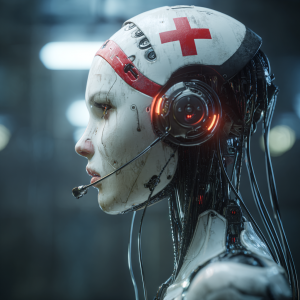In a world where your smartphone can solve equations faster than a math prodigy and ChatGPT can whip up a Shakespearean sonnet in seconds, the competitive edge of raw brainpower is slipping. Today, the human mind no longer has a monopoly on knowledge – machines can access and process information faster, and often more accurately, than even the sharpest human thinkers. So, if the old formula for success was IQ + Hard Work = High Performance, what’s the new equation? Spoiler: it’s not just about being smart anymore. As AI takes over more cognitive tasks, emotional intelligence (EQ), soft skills, and human insight are emerging as the critical differentiators. In this first part, we’ll break down why IQ alone won’t cut it in the age of AI, and why the leaders of tomorrow need a very different skill set than their predecessors. From understanding the basics of IQ, EQ, and soft skills to analyzing why AI is the ultimate IQ equalizer, this section sets the stage for a new definition of high performance. Buckle up, because the future belongs to those who can think like a human – and feel like one, too. And if you’ve ever worried about a robot taking your job, here’s the good news:
AI might be smart, but it’s still pretty bad at reading the room.
Part I: The Rise of EQ in the Age of AI
Why IQ Alone Won’t Cut It in the Age of AI
My Hypothesis:
As AI makes knowledge and analytical power ubiquitous, the competitive advantage of a high IQ is diminishing. In a world where everyone has a genius-level assistant in their pocket, just having raw intelligence or technical know-how is no longer a guarantee of high performance. The new differentiators of success are emotional intelligence (EQ), leadership abilities, and other soft skills – essentially, the human touch that AI can’t replicate. In simple terms, AI is leveling up the average Joe’s IQ, so the real edge now comes from EQ and people skills.
This hypothesis reflects a profound shift: knowledge has become a commodity, and human qualities like empathy, creativity, and adaptability are in higher demand than ever. Think about it – if AI can instantly provide answers and even make decisions based on vast data, what makes you special? It’s likely to be your wisdom and emotional savvy, not just your test scores.
In this new landscape, those who combine knowledge with emotional intelligence, intuition, and ethics will stand out. Our ability to connect with others, lead with empathy, and adapt to change is becoming the X-factor that separates good from great in careers and life
Defining the Key Terms: IQ, EQ, Soft Skills, High Performance
Before we dive deeper, let’s clarify what I mean by these terms:
Intelligence Quotient (IQ):
IQ is a measure of cognitive intelligence – in plain language, it gauges how good you are at logical reasoning, pattern solving, memory, and other analytical tasks. By design, the average IQ is 100 (most people score between about 85 and 115). A high IQ might help you solve calculus problems or win at trivia night. Traditionally, a high IQ was equated with being “smart” and was often seen as a predictor of academic and professional success. However, IQ mainly reflects analytical and problem-solving abilities, and it does not measure creativity or people skills. It’s possible to have a genius IQ and yet struggle with social situations or self-awareness.
Emotional Intelligence (EQ):
Emotional intelligence, often abbreviated as EQ (for “Emotional Quotient”), is the ability to recognize, understand, and manage your own emotions, as well as recognize and empathize with the emotions of others. In other words, EQ measures how well you handle the human side of life – from communication and empathy to self-awareness and self-control. Someone with high EQ is skilled at navigating social interactions, managing conflict, and leading or collaborating with others. Where IQ might help you solve a puzzle, EQ helps you understand people’s feelings, build trust, and influence or inspire others. Notably, research has found that emotional intelligence can account for a huge portion of what differentiates top performers: one Harvard Business Review analysis suggested nearly 90% of what sets high performers apart from peers is attributed to higher emotional intelligence. In the age of AI, EQ is increasingly viewed as crucial for roles that involve teamwork, leadership, and customer interaction – essentially, any situation where understanding and working with humans is key.
Soft Skills:
Soft skills refer to a broad set of non-technical skills that relate to how we work with others and manage ourselves. These include interpersonal skills like communication, teamwork, empathy, and conflict resolution, as well as personal traits like adaptability, creativity, problem-solving, and time management. Unlike hard (technical) skills such as coding or accounting, soft skills are more about how you interact with people and handle situations. They’re sometimes called “people skills” or “employability skills.”
A concise definition puts it this way: “soft skills are the interpersonal, human, people, or behavioral skills needed to apply technical knowledge in the workplace”. In practical terms, soft skills might determine how well you lead a team, how you cope with change or criticism, or how you network and negotiate. These skills often distinguish effective leaders and collaborators from merely competent technical performers. Importantly, soft skills tend to be transferable between jobs and are harder to automate – a spreadsheet or an AI can analyze data, but it can’t comfort an upset client or motivate a discouraged team member (at least not the way a human can).
In surveys, employers consistently say soft skills are as important as or even more important than technical skills; in one poll, 73% of companies said they value soft skills more than ever, and 19% said soft skills have become more important than hard skills– a shift they view as permanent. Why? Because while you can teach someone a technical skill relatively quickly, traits like initiative, dependability, or empathy are much harder to teach. Soft skills have become the “secret sauce” that makes employees effective in a modern, collaborative workplace.
High Performance:
High performance refers to consistently achieving excellent results or above-average outcomes in a given domain, especially over the long term. A high-performing individual is someone who doesn’t just meet expectations – they exceed them. In the workplace, this could mean surpassing targets, innovating new solutions, leading a team to success, or rapidly advancing in one’s career. High performance isn’t only about short bursts of brilliance; it’s often defined by consistent and sustainable success. One useful definition describes a high performer as someone “succeeding beyond standard norms consistently over the long term”.
That implies not just hitting one big goal, but maintaining excellence while also managing things like stress and work-life balance. Historically, high performance was often attributed to high IQ or technical mastery – for example, the smartest engineer or the top-scoring student was assumed to be a high performer. But as we’ll explore, the criteria for high performance are evolving. Today’s high performers often combine competence with creativity, resilience, leadership, and emotional balance. They use both head and heart: they make smart decisions and connect with people. In sum, high performance is the result (the “what”), and IQ, EQ, and soft skills are part of the “how” that result is achieved.
With these definitions in mind, let’s analyze how artificial intelligence is reshaping the landscape – reducing the premium on IQ and increasing the value of EQ and soft skills in determining who rises to the top.

AI: The Great IQ Equalizer
Artificial intelligence has often been described as a “great equalizer” of knowledge and cognitive ability.
Why? Because AI can store and process information on a scale no human brain can match, and it can deliver insights or answers to anyone who knows how to ask. Knowledge that once required expertise or high intellect is now a few keystrokes or voice commands away. This has profound implications for the importance of IQ.
Consider what IQ represents: the ability to learn, reason, and solve problems. Traditionally, someone with a high IQ could absorb and analyze information faster, recall facts more easily, or solve complex puzzles that left others stumped. In a pre-AI era, this gave them a formidable advantage in school and at work. The straight-A student or the chess champion had a unique edge – their brain could do feats others couldn’t. But now, we live in an era of Wikipedia and Google, and have recently leaped into an era of ChatGPT and advanced AI assistants. We’ve effectively outsourced a lot of our memory and even analysis to machines. The result is that a moderately intelligent person equipped with AI can outperform even a genius who doesn’t use those tools.
In other words, when every person has access to an AI that can answer tough questions or crunch numbers in seconds, having a naturally high cognitive horsepower (IQ) doesn’t set you apart as much.
Let’s break down a few specific ways AI is diminishing the relative importance of IQ:
Instant Knowledge & Expertise:
What we once had to learn through years of education or experience can sometimes be acquired on-demand via AI. Need to solve a differential equation or translate a paragraph of Chinese? An AI tool can do it instantly. Need the latest research on a medical condition or market trend? AI can summarize it for you. This doesn’t mean human expertise is obsolete – but it means access to expertise is now widespread. The value of memorizing facts or performing rote calculations has plummeted. In a very real sense, the internet and AI have become an “external brain” for everyone. The competitive edge thus shifts from knowing the most to interpreting and using knowledge the best.
Automation of Cognitive Tasks
We usually think of automation in terms of factory robots replacing manual labor. But AI is automating many cognitive tasks – the kind of tasks that typically required a lot of brainpower (and thus a high IQ) to do well. For instance, AI algorithms can review legal documents faster and more accurately than junior lawyers, or analyze medical scans more effectively than many radiologists. A technology consultant noted that roles involving pattern recognition and analysis (like reviewing contracts or diagnosing based on images) are “easy to automate” because an algorithm can do these tasks faster and more accurately than a human. This is not to say all such jobs will disappear, but the human doing them can no longer win on sheer processing power or memory – the AI can do that. Instead, the human’s value is in handling the parts the AI can’t (yet) do – such as complex judgment calls, ethical decisions, or interpersonal communication with a client.
Diminished Return on Analytical Brilliance:
Historically, fields like finance, engineering, or medicine richly rewarded those who could mentally juggle enormous complexity – essentially, people with very high IQ and specialized training. Today, those fields are increasingly aided by AI. The brilliant stock trader is less impressive when an AI can crunch market data 24/7. The master diagnostician is less singular when AI decision-support systems narrow down potential illnesses. **This doesn’t make human experts obsolete, but it means their competitive advantage has shrunk. If a machine can do 60–70% of what a top analyst or strategist can do, the human’s extra cognitive ability provides a smaller boost on top. As Harvard’s Amy Edmondson observes, even very skilled professionals will need to adapt because technology will handle a chunk of their tasks. In fact, IBM estimated that over just a three-year horizon, 120 million workers in major economies would need retraining due to automation – a sign of how far AI’s cognitive reach extends.
Cognitive Offloading & Skill Decay:
There’s also an interesting side effect – when we rely on AI for thinking tasks, we might not exercise our own cognitive “muscles” as much. If everyone uses GPS, fewer people bother developing stellar navigation skills. If you let AI compose your emails or code for you, you might not refine those skills yourself. Some researchers even speculate that over-reliance on AI could lead to skill decay in humans.This is a double-edged sword: on one hand, AI makes us collectively smarter (by offloading tasks), but on the other, our individual raw IQ-like capabilities might not be pushed to develop. Whether or not that’s a serious concern, it underscores that the future value of a high IQ could be undermined if we simply let AI do all the “thinking” work for us.
So does IQ become irrelevant? Not exactly. Analytical thinking is still extremely important – in fact, employers still rank it as a top skill. A strong IQ provides a foundation for learning and problem-solving. The difference now is that IQ alone is not enough, and its relative weight in the success formula is less. The playing field of raw intellect is being leveled by AI, much like the calculator leveled the field in arithmetic. Once upon a time, a person who could do huge calculations in their head was a marvel; after calculators, that skill stopped being special. We’re witnessing a similar moment across many domains of work and knowledge.
A telling anecdote comes from the world of hiring. Google – a company infamous for brain-teaser interviews and hiring only the “smartest” – discovered that traditional markers of IQ and academic smarts did not predict on-the-job success. Laszlo Bock, Google’s former HR chief, revealed that Google stopped even asking for GPA or test scores in most cases because “they don’t correlate at all with success at the company.”The people with perfect SATs and 4.0 GPAs weren’t necessarily the ones who excelled at Google’s real-world, team-based, fast-changing environment. Why? Google found that qualities like learning ability, emergent leadership, humility, and ownership mattered more than IQ alone. The “genius” who couldn’t collaborate or adapt didn’t shine, whereas someone with solid-but-not-stellar IQ who had great creativity and teamwork often became a top performer. In Bock’s words, academic environments train people for a certain kind of problem with clear answers, but “it’s much more interesting to solve problems where there isn’t an obvious answer” – and that requires curiosity, grit, an teamwork, not just book smarts.
AI is making the world full of problems where the obvious answers can be obtained by anyone (just ask the AI). The winners, therefore, will be those who excel at tackling the non-obvious problems and navigating ambiguity. Dave Coplin, a tech CEO, framed it well: “If an algo can do 30% of the tasks that I used to do, what can I do with that spare capacity? The winners are those who choose to do things that algos can’t.” Those “things algos can’t” often fall squarely in the realm of emotional intelligence, creativity, and leadership. In the next section, we’ll see why EQ and soft skills – far from being fluffy HR buzzwords – are becoming the critical skills of the future.

So, if raw brainpower is no longer the golden ticket, what’s the new blueprint for becoming a high performer in the AI era? In Part 2, we’ll break down the skills that truly set humans apart, including emotional intelligence, creativity, leadership, and adaptability. Spoiler: it’s not just about being the smartest person in the room anymore – it’s about being the most human. Stay tuned for the skills that might just save your career from the robots.
This article will be continued in Part II …
Stay curious, stay informed, and let´s keep exploring the fascinating world of AI together.
This post was written with the help of different AI tools.




